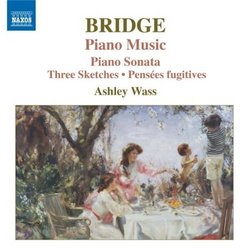| All Artists: Frank Bridge, Ashley Wass Title: Bridge: Piano Music Vol. 2 - Piano Sonata Members Wishing: 0 Total Copies: 0 Label: Naxos Original Release Date: 1/1/2007 Re-Release Date: 5/29/2007 Genre: Classical Styles: Chamber Music, Forms & Genres, Sonatas, Historical Periods, Classical (c.1770-1830), Modern, 20th, & 21st Century Number of Discs: 1 SwapaCD Credits: 1 UPC: 747313292127 |
Search - Frank Bridge, Ashley Wass :: Bridge: Piano Music Vol. 2 - Piano Sonata
CD Details |
CD ReviewsBridge's Superb Piano Sonata J Scott Morrison | Middlebury VT, USA | 07/27/2007 (5 out of 5 stars) "This is Volume 2 of a three-volume series -- No. 3 has not been released yet -- of all of the piano music written by Frank Bridge (1879-1941) and it contains what is undoubtedly his most significant work for piano, the Piano Sonata (1921-24). Its three-year gestation period suggests how difficult it was for Bridge to write. This was for at least two reasons. It is a memorial to his friend, composer Ernest Farrar, who was killed on the front lines in World War I and by which the composer, a lifelong pacifist, was deeply saddened. And it also represents a major change in Bridge's musical style. He had, early on, written in a late Romantic style, and then he moved more towards impressionistic writing, influenced by Debussy and Scriabin, and finally he began writing more chromatic and bitonal music as exemplified by the Sonata and the Second Piano Trio. Because of its ground-breaking style, the piece was turned down by its intended first player, Harold Samuel, and was then premièred by Myra Hess at the Wigmore Hall in late 1925. There have been two other recordings of it that I'm aware of. Peter Jacobs played it beautifully on a Continuum CD perhaps ten years ago, and I understand that Mark Bebbington has recorded it for Somm; I have not heard the latter performance. The Sonata takes more than half an hour, is in three movements of which the first is the longest. The first movement has two main themes -- both solemn, even agonized although the second theme has some tenderness as well -- that later figure in the succeeding movements. It is in extended sonata form and in spite of its unclear tonality one can make the form out even on first hearing. It ends abruptly to be replaced by the consolatory middle movement containing a lovely tender theme, an all but unrecognizable modification of the first movement's second theme. The finale -- Lento - Allegro ma non troppo -- brings us back to music evoking the horrors of the War which the excellent booklet writer, Andrew Burn, says reminds him of newsreel footage of soldiers going to their doom 'over the top of the trenches'. The sonata ends by returning to the opening theme 'drained of all hope.' A powerful work that gains on repeated listening. It is played marvelously by the young and talented British pianist, Ashley Wass. There are a couple of other latish short piano pieces included here: 'Lament for Catherine' (1915), written in memory of a child Bridge knew who died in the sinking of the Lusitania; it is probably better known in its string orchestra guise. And 'Three Improvisations for the Left Hand' (1918), written for a British pianist, Douglas Fox, who had lost his right arm in the war. The last of these, 'A Revel', is particularly virtuosic. The CD ends with six works that are from Bridge's early late-Romantic period: Three Sketches (1906), Moderato (1903), Pensées fugitives I (1902 -- this is the only one of three Pensées fugitives Bridge finished), and Scherzettino: Prestissimo (1902). These are, for me, fairly negligible works although they have a certain charm. For me the reason to have this disc is the Piano Sonata, certainly one of the finest piano sonatas written by a British composer. The earlier recording by Peter Jacobs is probably a little more 'settled in' and thus somewhat more immediately effective, but Wass's performance is also quite good and in any case the Jacobs is more than likely a bit difficult to obtain now. Strongly recommended for the Piano Sonata primarily. Scott Morrison" Astonishing Sonata N. Miller | Kansas | 02/17/2008 (5 out of 5 stars) "A very lovely, strange sonata. It has an emotional power that lifts it above the sonatas of Bax (who in all fairness is a much better orchestral composer!), and deserves to be heard and played more. The second movement is particularly haunting. Wass' playing throughout is admirable. I would recommend this recording, and Bridge's Phantasms for piano and orchestra on the Lyrita label - probably the most impressive piano music I have heard from a British composer!
" |

